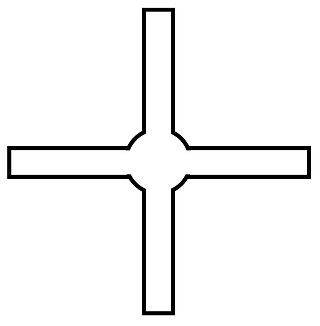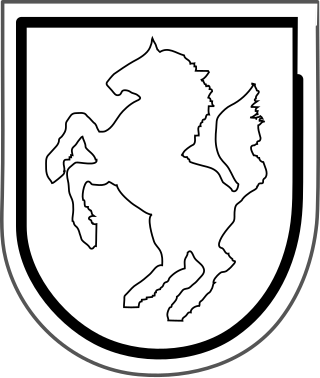The 1st Infantry Division was an infantry division that notably served in World War II as part of the Heer of Nazi Germany's Wehrmacht. It had been one of the original infantry divisions of the Reichswehr.

The 4th Infantry Division, designated 4.Infanterie-Division in German was one of the first divisions raised and served during part of World War II. In 1940 it was reorganized as 14th Panzer Division.

The 121st Infantry Division was a German Wehrmacht division in World War II. It was a part of the German XXVIII Army Corps. In September 1941 the formation, on arriving in Pavlovsk, Saint Petersburg; engaged in the siege of Leningrad. By October 1941 it was down to 40% of its authorized strength and 3 infantry battalions had to be disbanded due to high casualties. In 1944 it was involved in the retreat from Leningrad through the Baltic states wherein it fought in the Battle of Pskov. It remained in the Courland pocket until the end of the war.
The 21st Infantry Division was a German military unit which fought during World War II.

The 14th Infantry Division was a formation of the Germany Army (Wehrmacht) which fought during World War II.
The German XXXVIII Corps was a German army corps during World War II.

The 30th Infantry Division of the Wehrmacht was created on 1 October 1936 in Lübeck and mobilized on 26 August 1939 for the upcoming invasion of Poland. At that time, it consisted of the usual German infantry division elements: three infantry regiments of three battalions each, one three-battalion regiment of light artillery, one battalion of heavy artillery, a panzerjager (anti-tank) battalion, an aufklärungs (reconnaissance) battalion, a signals battalion, a pioneer (engineer) battalion, and divisional supply, medical, and administrative units.

The 15th Infantry Division was an infantry division of the German Army during the interwar period and World War II, active from 1934 to 1945.

Maximilian Fretter-Pico was a German general during World War II. He was a recipient of the Knight's Cross of the Iron Cross with Oak Leaves of Nazi Germany.
II Army Corps was a corps in the German Army during World War II.

The 75th Infantry Division was a German infantry division in World War II. It was formed on 26 August 1939.
The 134th Infantry Division was a German division in World War II. It was formed in October 1940.

V Army Corps was a corps in the German Army during World War II.

German XI. Corps was a corps in the German Army during World War II.
The 290th Infantry Division was a German infantry division in World War II. It was formed in the Munster Training Area in Wehrkreis X on 6 February 1940 and surrendered to Soviet forces at the end of the war as part of Army Group Courland.
X Army Corps was a corps in the German Army during World War II. It was formed in mid-May 1935 from the Cavalry Division.
XII Army Corps was a corps in the German Army during World War II. It was formed in the Wehrkreis XII recruitment and training district in Wiesbaden in October 1936 and was mobilized before the outbreak of war at the end of August 1939.
The LIII Army Corps was a corps of the German Army during World War II. It was first deployed in 1941 and was active as part of various armies under Army Group Centre until 1944, when it was destroyed during the Soviet Red Army operations Bagration and Kutuzov in June and July 1944. The corps suffered enormous casualties as a result of the Soviet attacks. All of its divisions were destroyed and all but a few of the soldiers were killed or captured by the Soviet Union. A new formation named LIII Army Corps was subsequently deployed in December 1944, when it was assigned to Seventh Army and fought on the western front until surrendering to United States Army forces in April 1945.

The XXVI Army Corps was a Wehrmacht army corps during World War II. It existed from 1939 to 1945. It was also known as Corps Wodrig during the Invasion of Poland.
The 270th Infantry Division was an infantry division of the German Heer during World War II.
This page is based on this
Wikipedia article Text is available under the
CC BY-SA 4.0 license; additional terms may apply.
Images, videos and audio are available under their respective licenses.









